高二英语选修七unit4-reading-导学案
2023年模块七 unit 4 Reading 教案(译林牛津版高二英语选修七教案教学设计)整理
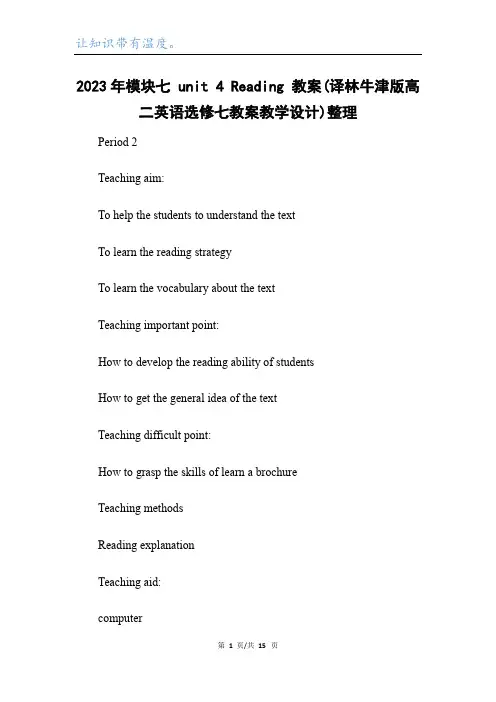
2023年模块七 unit 4 Reading 教案(译林牛津版高二英语选修七教案教学设计)整理Period 2Teaching aim:To help the students to understand the textTo learn the reading strategyTo learn the vocabulary about the textTeaching important point:How to develop the reading ability of studentsHow to get the general idea of the textTeaching difficult point:How to grasp the skills of learn a brochureTeaching methodsReading explanationTeaching aid:computerTeaching procedures:Step 1 GreetingsGreat the class as usualStep 2. RevisionReview the language point in welcome to the unitStep 3 Lead-inZhao Ning went on a trip to London . she collected a brochure about th e Underground. We will find the history of its development and the important people who influenced the London Underground. Next, we will learn the brochure and deal with the questions.Step 4. Fast-readingQuestions1. When was the first underground system opened?2. Why was the Victoria Line important?3. What did Charles Holden do?Suggested answers1. In 1863.2. It was important because it linked with other lines at almost station , making the system more user-friendly.3. He is the architect that designed many of the new stations built between 1918 and 1938. Many of the stations are still in use today.Step 5. careful-readingAsk the students to read the passage again and finish C1 and C2 and part D.C1.Questions1. Why was an underground system first developed in London?2. What was the London Underground like in 1863?3. What did Charles Yerkes do to improve the underground?4. What are some of the different things that the underground has functioned as?5. what happened to the London Underground after World War Ⅱ?6. What does it mean when the brochure says that the underground system is user-friendly?Answers1. Most railway tracks did not go into the London city centre, so buses were required . This increased traffic on the road. The underground system transported more people without increasing traffic on the road.2. The carriages did not have windows and were pulled by steam engines through narrow tunnels.3. He bought many of the different lines and set up the Underground Groups.4. The underground has functioned as a bomb shelter, an aeroplane factory, an anti-aircraft centre and meeting rooms for the government administration.5. After World War Ⅱ,more lines were added because more people traveled on the underground.6. It means that many of the lines are linked at manystations .Therefore , it is very convenient for ridersTo go to different places in the city from any station.C 2Date Event185418631868188419331918--1938After 19451977Answers:1. An underground railway was decided to be built.2. The first tunnels were opened.3. The next section of the underground system was opened.4. The underground service was provided in the middle of the city.5. A public organization was created.6. London Transport was expanded.7. More people traveled on the underground and more lines were added.Step 6 practiceFinish part D on page 52Keys1 .d . 2. e. 3. b. 4.f. 5.c. 6.h. 7.g. 8.a.Step 7 summary and homeworkPeriod 3Teaching aim:To help the students to master some important words and phrases Teaching important pointDistant transport link to accelerate functionTeaching difficult point:How to help the students to master these important language points Teaching methodsReading explanationTeaching aid:computerTeaching procedures:Step 1 GreetingsGreet the whole class as usual.Step 2 RevisionAsk some students to speak out the form of a debateStep 3 ExplanationIn this class , we will deal with the language points in reading, Listen carefully and write them in your notebook..1. distinction 声誉,声望,区分,级别eg I don’t understand your distinction: surely all painting is art?draw/make a distinction between 对…… 加以区分gain/win distinction 出名win a distinction for 因… … 而获功勋with distinction 以优异的成果,以杰出的表现without distinction 无差别的,一视同仁地2 . distant [adj] 遥远的,冷淡的,疏远的,不易见的be distant toward sb. 对某人冷淡in the distance 在远处at a distance 相距,相隔,稍远处from a distance 从肯定距离keep sb at a distance =keep one’s distance from与… … 保持肯定的距离e.g 1. At a distance of six miles you can’t see much.2. We can see the ancient ruins in the distance.3.You can see the picture clearly if you stand at a distance.PracticeThe dog looked dangerous , so I decided to keep my distance from it .The faces of four famous American presidents on Mount Rushmore can be seen from a _______of 60 miles.A. lengthB. distanceC. wayD. space3 transporttransport sth from … to …the transport of goods by airin transports of delightEg1.A bus transported us from the airport to the city.2. The transport of goods by air costs a lot.PracticeThe cars ________to the far-off countries by ship.A. have transportedB. are transportingC. are transportedD. transport4. accelerate 加速,促进。
学案设计_高中英语_选修七Unit4
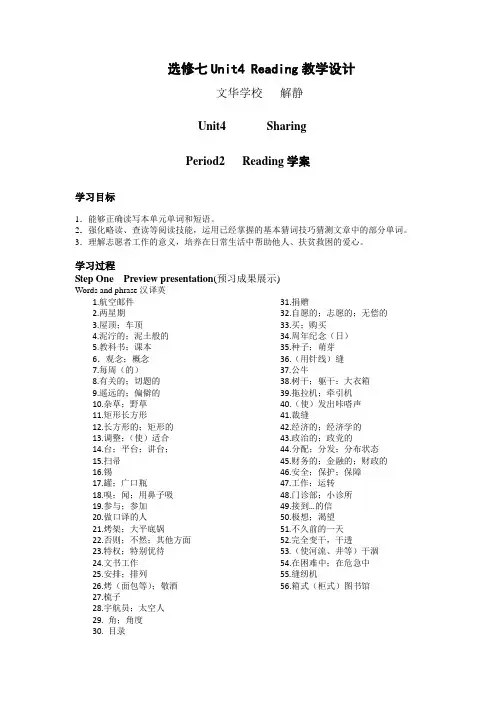
选修七Unit4 Reading教学设计文华学校解静Unit4 SharingPeriod2 Reading学案学习目标1.能够正确读写本单元单词和短语。
2.强化略读、查读等阅读技能,运用已经掌握的基本猜词技巧猜测文章中的部分单词。
3.理解志愿者工作的意义,培养在日常生活中帮助他人、扶贫救困的爱心。
学习过程Step One Preview presentation(预习成果展示)Words and phrase汉译英1.航空邮件2.两星期3.屋顶;车顶4.泥泞的;泥土般的5.教科书;课本6.观念;概念7.每周(的)8.有关的;切题的9.遥远的;偏僻的10.杂草;野草11.矩形长方形12.长方形的;矩形的13.调整;(使)适合14.台;平台;讲台;15.扫帚16.锡17.罐;广口瓶18.嗅;闻;用鼻子吸19.参与;参加20.做口译的人21.烤架;大平底锅22.否则;不然;其他方面23.特权;特别优待24.文书工作25.安排;排列26.烤(面包等);敬酒27.梳子28.宇航员;太空人29. 角;角度30. 目录31.捐赠32.自愿的;志愿的;无偿的33.买;购买34.周年纪念(日)35.种子;萌芽36.(用针线)缝37.公牛38.树干;躯干;大衣箱39.拖拉机;牵引机40.(使)发出咔嗒声41.裁缝42.经济的;经济学的43.政治的;政党的44.分配;分发;分布状态45.财务的;金融的;财政的46.安全;保护;保障47.工作;运转48.门诊部;小诊所49.接到…的信50.极想;渴望51.不久前的一天52.完全变干,干透53.(使河流、井等)干涸54.在困难中;在危急中55.缝纫机56.箱式(柜式)图书馆Step Two ScanningPart 1(Paragraph 1) End of the letter.Part 2(Paragraphs 2-3) Opening of the letter and introduction to what will be talkedabout in the passage.Part 3(Paragraphs 4-8) The school where Jo worked and Jo's work at school.Part 4(Paragraph 9) Jo and Jenny visited Tombe's home in the village.Step Three SkimmingSkim the passage and finish the following tasks:Task 1 Answer the following questions:(1)Why did Jo send Rosemary some photos?(2)Why was science the most challenging subject for Jo?(3)Why did the boys start jumping out the windows?(4)Why should it take Jo and Jenny two and a half hours to get to the village?Task 2 What have you learned about the customs and lives of the people in Tombe's village?Read Paragraphs 4-8 carefully and complete the table below.Step Four Reading aloudRead the passage aloud, find and analyze the difficult sentences.1. I’ve included some photos which wil l help you picture the places I talk about.2. It takes me only a few minutes to walk to school down a muddy track.3.The other day I was showing the boys the weekly chemistry experiment when, before I know it, the mixture was bubbling over everything !4. You asked whether I’m getting to know any local people.5. When hot, he placed them in an empty oil drum with kau kau, corn and greens.6. It was such a privilege to have spent a day with Tombe’s family.Type of housessmall ,round ,made of bamboo ,grass roofs ;men's huts have grass sticking out of the top of the roof ,no windows ;small doorway ;floor covered with fresh grassDiet Sweet potato ,corn ,vegetables peanuts Family relationshipslarge extended families(Everyone seems to be a relative of Tombe's).PossessionsNot many —one broom ,a few tin plates and cups ,a couple of jar Cooking methodsHot stones are placed inan oil drum ,thenvegetables are placed in the drum ,covered withbanana leaves andsteamed.Agriculture Tools are very basic ,e.g.a digging stick(There is no machinery.)Sleeping arrangements A new sleeping platform for the guests ,Kiak usually slept in her ownhut. Beliefs The villagers believe in evil spirits.They believe that leftover food attracts evil spirits so they dry it out in a can over thefire.Then the can isthrown out of the hut.Step Five Discussion1.Why do you think Jo became a volunteer in PNG?2.Would you like to work as a volunteer in a poor area?Give reasons.Step Six ConsolidationJo worked at a 1._________school whose classrooms were made of bamboo and grass. There’s no 2._________or water there. It took the students about two hours to get to the school. Jo hoped to make some 3._________to the children’s lives by teaching them. The other day, Jo 4._________Tombe’s home. When they arrived at the village, Tombe’s mother who had been 5._________in her garden, started crying “ieee ieee”. Tombe’s father led them to his house, a low bamboo hut with grass6._________out of the roof, where he could only see a few tin plates and cups and a couple of7._________. What they ate were sweet 8._________, corn and greens. That night Jo and Jenny slept on a newly made 9._________. They left the village the next morning after many 10._________and handshakes.Step Seven HomeworkWrite a passage about 100 words to introduce the village and life in the village according to the photos and the text.Eg.One of my students,Tombe lives in a small village in Papua New Guinea.The visit to his home impressed me___________________________________________________________________________________________________________ ____________________________________ ____________________________________ ____________________________________ ____________________________________ ____________________________________ ________________________________________________________________________ ____________________________________ ____________________________________ ____________________________________ ____________________________________ ____________________________________ ____________________________________ ____________________________________ ____________________________________ ____________________________________ ____________________________________ ____________________________________ ____________________________________ ____________________________________ ____________________________________ ____________________________________ ____________________________________ ___________________________________。
选修七unit 4导学案印刷
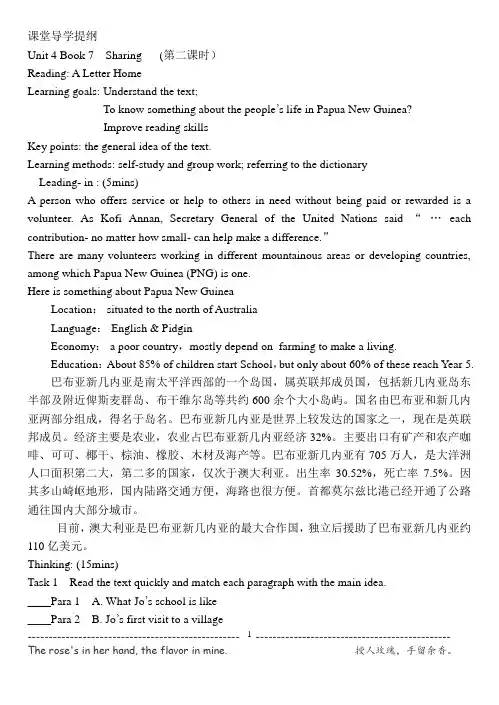
课堂导学提纲Unit 4 Book 7 Sharing (第二课时)Reading: A Letter HomeLearning goals: Understand the text;To know something about the people’s life in Papua New Guinea?Improve reading skillsKey points: the general idea of the text.Learning methods: self-study and group work; referring to the dictionaryLeading- in : (5mins)A person who offers service or help to others in need without being paid or rewarded is a volunteer. As Kofi Annan, Secretary General of the United Nations said “…each contribution- no matter how small- can help make a difference.”There are many volunteers working in different mountainous areas or developing countries, among which Papua New Guinea (PNG) is one.Here is something about Papua New GuineaLocation: situated to the north of AustraliaLanguage: English & PidginEconomy: a poor country,mostly depend on farming to make a living.Education: About 85% of children start School,but only about 60% of these reach Year 5.巴布亚新几内亚是南太平洋西部的一个岛国,属英联邦成员国,包括新几内亚岛东半部及附近俾斯麦群岛、布干维尔岛等共约600余个大小岛屿。
人教版高二英语选修七第四单元《Unit 4 Reading A Letter Home》教学设计
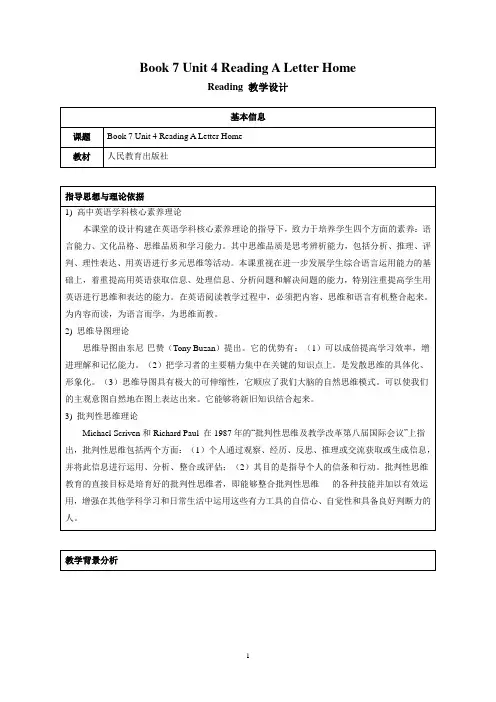
Book 7 Unit 4 Reading A Letter HomeReading 教学设计Step 3 Read for Information 1. Read Part 2, underline the words and expressionsaccording to the same words to answer thequestions.1. (1)仔细认真阅读第二部分,了解Jo 所在学校的生活,总结Jo支教生活的见闻,进而让学生了解PNG国家孩子的学校生活,从而引发学生对自己学校生活的思考,让学生感知从自身做起也可以帮助贫困地区的孩子。
(2)仔细认真阅读第二部分,了解Jo和Rosemary参观Tombe村庄以及村民的生活的现状,以及Jo的感受。
Step4 Read for Thinking 1. 1. Discuss in pairs: How can we help thechildren in poor areas?Possible answer1. Donate pocket money \clothes \books tothem.2. Raise money and send it to them.3. Call on people to show their love.4. Call on our government to take measures tohelp them.5.Go there to work as a volunteer2.We should treasure our present life and learnto share.If everybody offers a little love, the world will1. 利用所学单词和词组发表自己对支援帮助贫困地区孩子的看法。
不仅锻炼学生用英语进行表达的能力,还重在提高学生用英语进行思维的能力,增强学生思维能力。
高二英语选修七_Unit4_Reading名师教学设计
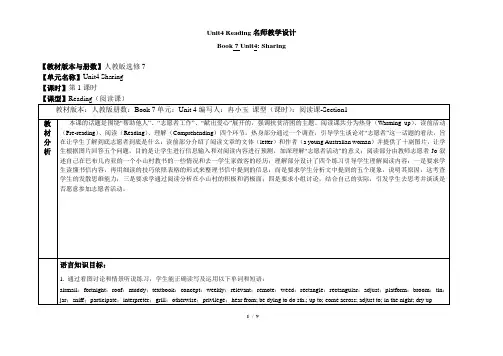
Unit4 Reading名师教学设计Book 7 Unit4: Sharing【教材版本与册数】人教版选修7【单元名称】Unit4 Sharing【课时】第1课时1/ 92/ 9【本课时教学设计】3/ 9DELC 2获取新知识Step2Pre-Reading(读前)(6 mins)1. Teacher asks students a moral question and guide thestudents to skim the text and discuss with students what thevalue of such a website would be.(3 mins)T: Is it right for some members of society to get extra helpbecause they have a disability?S: (Group discussion and give answers)T: “Family Village” is a website offering the disabled acommunication opportunity in the Internet. Do you think itbeneficial to the disabled people?2. Teacher asks the Ss to predict the content of the text byinferring from the title and picture.(3mins)T: Please glance at the title and picture. Can you guess whatkind of information would be included in disabled students’story?(make a list on the board of possible topics)S: Make predictions.1.关于残疾人是否应该得到更多的帮助这个话题的讨论为引入阅读文本的背景知识进行铺垫: 让学生更加了解这个网站的存在意义和价值。
人教版选修7导学案:unit 4 sharing reading(学生版)(精修版)
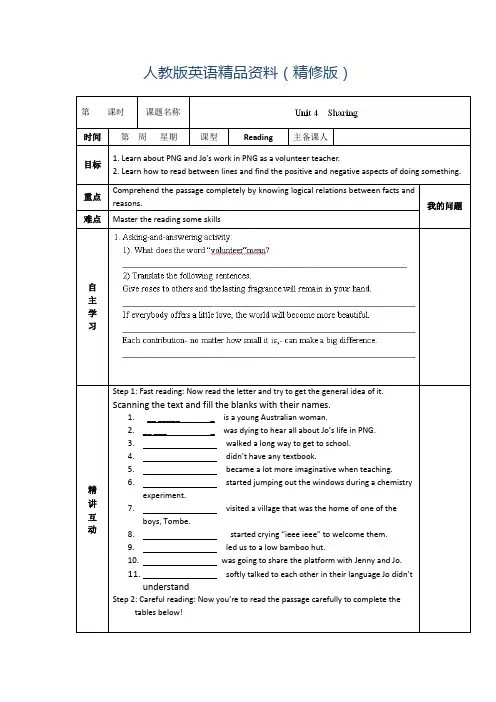
人教版英语精品资料(精修版)第课时课题名称时间第周星期课型Reading主备课人目标1. L earn about PNG and Jo’s work in PNG as a volunteer teacher.2. Learn how to read between lines and find the positive and negative aspects of doing something.重点Comprehend the passage completely by knowing logical relations between facts and reasons.我的问题难点Master the reading some skills自主学习精讲互动Step 1: Fast reading: Now read the letter and try to get the general idea of it. Scanning the text and fill the blanks with their names.1.__ _____ _ is a young Australian woman.2.__ ___ _ was dying to hear all about Jo’s life in PNG.3.walked a long way to get to school.4.didn’t have any textbook.5.became a lot more imaginative when teaching.6.started jumping out the windows during a chemistryexperiment.7.visited a village that was the home of one of theboys, Tombe.8.started crying “ieee ieee” to welcome them.9.led us to a low bamboo hut.10.was going to share the platform with Jenny and Jo.11.softly talked to each other in their language Jo didn’tunderstandStep 2: Careful reading: Now you’re t o read the passage carefully to complete the tables below!。
选修7 Unit 4 Sharing Period2 Reading导学案思路设计
选修7 Unit 4 Sharing Period2 Reading导学案思路设计一.整体设计思路1. 作品简介本节课以阅读为主线,以一位支教老师的亲生经历,讲述了他所执教的学校的情况以及第一次去学生家做客的经历。
通过本课的学习,让学生联系自己的校舍,教学条件,生活状况等,从而引发学生思考,树立正确的价值观和人生观2. 教学重点:a.获取巴布亚新几内亚独立国各部落生活状况和风俗习惯的信息;b.阅读能力的培养和阅读技巧的训练,如精读课文完成表格填空等。
3. 教学难点:a. 理解作为志愿者工作的意义,从而树立正确的价值观;b.训练用英语获取信息、处理信息、分析问题和解决问题的能力。
4.教学方法:a. 任务型教学法本课选择任务型教学,如要求学生课前预习阅读文章,课堂进行小组讨论,填写信息表及概括段落大意等,培养和强化学生的语言实践能力和自主学习能力。
b.多媒体辅助教学法利用多媒体展示相关图片及播放影片,激发学生学习兴趣,提高课堂教学效率。
二.具体设计思路(一)预学案:I. Discovering useful words and expressions1.收到某人来信_______________2.渴望做某事____________________3.前不久的一天________________4.参加__________________________5.有意义______________________6.与...握手______________________7.通过考试__________________ 8.偶遇_________________________9.适应______________________ 10.干涸_________________________设计说明:引领学生在上一课时词汇学习的基础上,对课文中要用到的单词短语进行预习总结,为课堂的整体阅读扫清部分语言障碍Ⅱ. Do you know the country“Independent State of Papua New Guinea”?Where is it?_______ III、Read the text and find out the names.1. _____ __ is a young Australian women.2. __________was dying to hear all about Jo’s life in Papua New Guinea.3. _________ walked a long way to get to the school.4. __________didn’t have any textbooks.5. ___ __ ___ became a lot more imaginative when teaching.6. ___ __ ___ started jumping out the windows during a chemistry experiment.7. ____ ____ visited a village that was the home of one of the boys, Tombe.8. _________ started crying “ieee ieee” to welcome the m.9. _________ led us to a low bamboo hut.10. _________ was going to share the platform with Jenny and Jo.11. _________ softly talked to each other in their language Jo didn’t understand.设计说明:指导学生在课前查找关于课文背景的相关信息,充分调动学生学习的积极性,也为课上理解课文信息做好了铺垫。
人教版高中英语选修7Module 7Unit 4 Sharing (Reading)阅读导学案设计A
Module 7Unit 4 Sharing (Reading)导学案A版学习目标:知识目标:了解JO的志愿者生活及故事,学习相关词汇。
能力目标:提高阅读时猜词、略读,归纳和数字计算题的能力。
情感目标:理解“志愿者活动、献爱心活动、合作共享”等的意义,培养在日常生活中帮助他人,扶贫救困的爱心,树立正确的人生观、价值观。
学习重点难点:细节理解题;第一部分:预习案背景知识:You've seen people in needs on the news after a hurricane, earthquake, or other disaster. Perhaps you've walked past homeless people who are living on the streets. Or maybe you've been to an animal shelter and wished you could give every pet a home. So what can you do to help people (or animals) who need it? The answer is — volunteer!V olunteering means spending some of your free time helping others. You may volunteer to help other people, such as the families who lost their homes after the Wen Chuan earthquake. But you can also volunteer to protect animals, the environment, or any other cause that you care about.V olunteering helps others, but it can also help you, too. If you're upset about something that's happened — like a hurricane or other disaster — doing something about it can be a great way to cope with your feelings.V olunteering also lets you see your own life in new ways. Sometimes it's easy to worry about stuff like grades or get annoyed because you don't have the most expensive sneakers or the newest computer game. V olunteering lets you spend some time focusing on others for a while.What does V olunteering mean?_____________________________________________________________________________________我的疑惑:________________________________________________________ 学法指导:1.快速浏览课文前四段,完成预习案I;2.通读全文,理清文章脉络,完成预习案II。
(完整版)人教版英语选修七unit4-reading导学案
Book 7 Unit 4 Sharing 导学案Task I. Skimming1.Divide the passage into 4 parts and match the main idea of each paragraph.Part 1(Para. 1) End of the letter.Part 2(Para. 2-3) Opening of the letter and introduction to what will be talked about in the passage. Part 3(Para. 4-8) The school where Jo worked and Jo's work at school.Part 4(Para. 9) Jo and Jenny visited Tombe's home in the village.2. Fill in the blanks with the names mentioned in the text.1. ________ is a young Australian women.2. _________ was dying to hear all about Jo's life in Papua New Guinea.3. _________ walked a long way to get to the school.4. didn't have any textbooks.5. ______________ became a lot more imaginative when teaching.6. _________ started jumping out the windows during a chemistry experiment.7. ____________ visited a village that was the home of one of the boys, Tombe.8. __________ started crying "ieee ieee"to welcome them.9. __________ led us to a low bamboo hut.10. __________ was going to share the platform with Jenny and Jo.11. _____________ softly talked to each other in their language Jo didn't understand.Task II. Detailed readingRead the passage carefully and answer the questions based on each part.Part 1(Para. 1) Why did Jo send Rosemary some photos?Part 2 (Para. 2-3)1: Why does Jo call the high school a “bush school”2: Were the boys friendly to Jo? How do you know?3: How long does it take the students to go to school?4: Why was science the most challenging subject for Jo?5: Can you find some other facts about the poor teaching conditions?6. How did Jo deal with the poor teaching conditions?Part 3(Para. 4-8)1.Why should it take Jo and Jenny two and a half hours to get to the village?1. Science is the most difficult subject as the students know a little about doing experiments.2. In Tombe’s village, all people a re the relatives of his family.3. As it is very remote, it took two weeks to arrive in PNG .4. Since I arrived, I have been always self-confident.5. Tombe’s families were so friendly that they laid fresh grass on the floor for me.6. Before my volunteer career, I learnt a lot about the local custom and natives.7. Even it is poor and less developt, I suited the local condition soon after my arrival.8.Many of the boys have to walk a long way to school and I usually walked up to two hours.9. Boys jumped out of the windows as they were scared.10. Now I knew local people quite well after I visited Tombe’s family.11. I visited Tombe’s family alone.12. The villagers’ huts are similar to school classrooms except that they were small and darkinside.Task IV. Summary1. How did the writer’s feelings and attitudes change when she worked in local school?2. Why does the writer consider it as a privilege to visit Tombe’s family?3. Do you think the passage is well-organized? if you try to writer the passage, what will be your structure like?。
英语选修七_unit_4_reading导学案
.Book 7 Unit 4 Sharing 导学案Period I Warming-up, Pre-reading and Reading学习目标 >>1. Learn more about the topic "sharing".2. Develop reading skills by skimming, scanning and careful reading.【学习重点】Develop reading skills.【学习难点】How to skim, scan and carefully read the text effectively.预习案Previewing Case一、重点词汇1. n.两星期2. adj. 泥泞的;泥土般的→ n.泥巴,泥土3. n.观念;概念 4. adj.有关的;切题的5. adj.遥远的;偏僻的 6. vi. & vt.调整;(使)适合7. vi.参与;参加→ n.参加,参与→ n.参与者8. conj.否则;不然 adv.用别的方法;其他方面9. n.特权;特别优待 10. n.目录11. vt.捐赠→ n.捐赠→ n.捐赠者12. adj.自愿的;志愿的;无偿的→ n. & vi.志愿者,自愿做…二、重点短语1.接到……的信2.极想;渴望3.不久前的一天4.和……有关5.参与……;参加……6.说实在的7.(指河流、井等)干涸8.在困难中;在危急中9.完成,穿过10.偶然遇到或发现;碰见;被理解11.伸出12.和某人共享某物13.(使浸水等之物)完全变干;干透14.熄灭,减弱15.绝种,消灭三、课外拓展 A brief introduction to Papua New Guinea (PNG)巴布亚在马来语中意为“卷发人”。
16世纪中叶,葡萄牙人来到该岛时,见当地居民和自然景观很像非洲的几内亚,故称之为新几内亚。
- 1、下载文档前请自行甄别文档内容的完整性,平台不提供额外的编辑、内容补充、找答案等附加服务。
- 2、"仅部分预览"的文档,不可在线预览部分如存在完整性等问题,可反馈申请退款(可完整预览的文档不适用该条件!)。
- 3、如文档侵犯您的权益,请联系客服反馈,我们会尽快为您处理(人工客服工作时间:9:00-18:30)。
波峰中学高二英语课前双基预习案(A)姓名班级组别编制辛成霞时间编号03 审批_______选修七Unit 4 Sharing【学习目标】Language Aim:Get students to learn and grasp the important useful new words and expressions and patterns in this article.Ability Aim:Get students to use some useful new words and expressions correctly.Emotion Aim: Develop students’ spirit of cooperation and teamwork.【重点难点】The usage of important words and expressions【完成目标】、B e f o r e c l a s s课前预习案:(自主学习区)使用说明&学法指导:1、在预习时,先拼读本单元的词汇,对于拼读不确定及不会读的单词可在组内解决或在早读时间解决。
2、完成时间:20分钟。
一.Key words.1.___________n.两星期2.___________adj. 泥泞的;泥土般的→___________ n.泥;泥浆3.___________ adj.& adv.每周(的)→ _____________ n.周;星期4.___________ adj.遥远的;偏僻的→___________(同义词)5.___________ vi.& vt. 调整;(使)适合→ _____________ n. 调整6.___________ conj.否则;不然adv.用别的办法;其它方面7.___________ n. 特别;特别优待8.___________ n.安排;排列→_______________ v.安排;排列9.___________ n. 宇航员;太空人→ ___________ n.天文学家10.___________ n.角;角度→______________ n.天使11.___________ vt.捐赠→ ___________ n.捐献;捐赠→ _____________n. 捐赠者12.___________ adj.自愿的;志愿的;无偿的→______________n.志愿者v.自愿(做)13.___________ vt.& n.买;购买→ _____________(同义词)14.___________ adj.政治的;政党的→ ___________ n.政治15.____________vt.分配;分发→ ________________ n. 分配;分发;分布状态16.____________ n.安全;保护;保障→ ________________ adj. 安全的;放心的17.___________vi.工作;运转vt.操作→__________n. 操作;手术→ _________n.操作员;经营者二.key phrases.1._______接到……的信2. ___________极想;渴望3. the other day ____________4. dry out ________________5.dry up6.in need三课文理解1.巴布亚新几内亚独立国首都: 莫尔兹比港Port Moresby 面积: 46.2万平方公里人口: 430万人语言: 英语民族: 美拉尼西亚族宗教: 基督教新教、拜物教货币: 基那国庆节: 9月16日时差: 比北京时间早2小时气候: 热带雨林气候2.The definition of VolunteerPeople who help others in their community or outside their community would be called volunteers. However, they would not be called volunteers if they help their parents, other relatives or friends.What do the volunteers usually do to help other people?A possible version: The volunteers make their greatest efforts to help others. For example, they collect money for the Hope Project to help poor children afford their schooling; they go to serveold people in the community; they join “1 help 1” project to visit elderly people who live alone andhelp with shopping, do jobs in the house, etc.3.What similarities and differences can you find between Jo’s classroom and yours?Similarities to my classroom4)1). 2.)3) 4)Differences from my classroom1) 2) 3)4) 5) 6)4课文结构 (1)scanning find out the names1. _________ will receive this letter from Jo.2. _____ become a lot more imaginative in teaching.3. ____________ did visit a village that was the home of one of the boys, Tombe.4. _______ started crying “ieee ieee” to welcome them.5. _______ led us to his house, a low bamboo hut.6. _______ was going to share the platform with Jenny and Jo.(2)Divide it into four parts, and summarize what each part is about.Part1 (paragraph___)____________________________________________Patt2 (paragraph___)____________________________________________Part3(paragraph___)_____________________________________________Part4(paragraph___) _____________________________________________ (3)Choose the best answer.1. The purpose that the author wrote the letter is that ______.Ashe wanted to tell Rosemary her teaching life in the high school.B. she wanted to tell Rosemary her learning life in the high school.C.she wanted to tell Rosemary that she couldn’t get any money by teaching the poor studentsD. she wanted to tell Rosemary how happy she was in the small village.2. In a chemistry experiment the boys jumped out of the windows because they _____.A. were frightened by the bubbling mixtureB. couldn’t stand the terrible smell of the mixtureC. didn’t like doing chemistry experimentsD. knew chemistry was not relevant to them3. Which of the following is TRUE about Jo’s attitude?A. She is sure that all the boys will go to college in the future.B. She believes that chemistry is very useful to the boys.C. She is wondering if she can make any difference to the boys’ lives.D. She doesn’t like the simple life in the mountain village.4. Which of the descriptions is NOT right about Tombe’s house?A. It was a low bamboo hut with grass sticking out of the roof.B. It was dark and there was a fireplace in the centre of it.C. It was round-shaped, with small windows and a narrow doorway.D. There were only a few possessions in it.5. Why does Jo wonder how relevant chemistry is to the kids?A. Because she thinks chemistry is too difficult to learn.B. Because she thinks chemistry may ma ke little difference to the kids’ life.C. Because the kids there hardly come across anything of chemistry.D. Because she thinks chemistry useless.6. By writing “The only possessions that I could see were…”, the author wants to tell us ________.A. Tombe’s family were kind-heartedB. Tombe’s family were guest-loversC. Tombe’s family only used simple thingsD. Tombe’s family were too poor7. Why did Tombe throw out the tin can?A. Because he believed the can attracted evil spirits.B. Because he believed any leftovers attracted evil spirits.C. Because he believed the can has no use at all.D. Because he believed the grill attracted evil spirits.8. How did Jo feel after the visit to Tombe’s family?A. HappyB. SadC. WorriedD. Upset本节课你学到了什么?波峰中学高二英语课后能力练(B)一.完成句子1. 我昨天收到了纽约的姐姐的来信。
